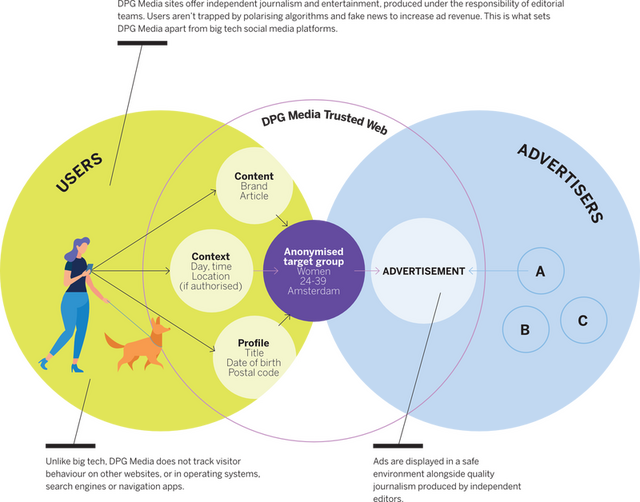GENERAL
DPG MEDIA STOPS SELLING ADS THROUGH AUCTIONS
“Our data collection respects people’s privacy”
Last autumn, DPG Media’s ‘Trusted Web’ strategy led it to suspend the active sale of app ads through ‘open web’ auctions. Website ads will soon follow. Anne Bouwman, head of programmatic trading, explains why this is better for both readers and advertisers.
Eind 2022 nam DPG Media het Waalse Wikipower over. Een strategische zet die aansluit bij de missie om de Belgische energiemarkt efficiënter en consumentvriendelijker te maken. Waar staan we een jaar later?

Anne Bouwman
(35), HEAD OF PROGRAMMATIC TRADING
Why is DPG Media moving away from open web auctions?
“Some time ago, we decided to launch our own advertising system so that we could stop relying on big tech, which has unacceptable downsides for advertisers and media consumers. Now we want to go one step further and reduce our dependence on the open market as much as possible. There are three reasons for this. The first is that the open market generates too little revenue. Second, consumer data isn’t safe with big tech, because there’s no certainty about how it’s being processed or who’s buying it. And last but not least: the results are just too messy, as quality can be difficult to guarantee. A few years ago, we had those dodgy crypto ads featuring John de Mol and other Dutch celebrities. When we wanted to block that advertiser, it was like searching for a needle in a haystack.”
Why can’t DPG Media do without the open market quite yet?
“That’s our goal, and we’re actually ready to go completely independent with our own formats and high-quality ad space. But advertisers – the buyers – also need time. Moving away from the open market creates more work for them. We have to convince them to change their strategy, and to start using our Ad Manager or our other direct buying options. Instead of buying ad space with a single click, they now have to go through several additional steps. Because some of our clients have centralised their programmatic procurement internationally, we’ve also hired someone to convince international hubs. But it’s going great – we’re seeing positive results for our apps, where most of our regular readers are. Advertisers who’ve made the switch are very happy with the quality, and also the convenience.”
What are the benefits of the Trusted Web system for advertisers?
“We offer advertisers a brand-safe environment of trusted and authoritative media titles with effective proprietary ad formats. And because we use our own free self-service platforms – Ad Manager and Direct – we cut out all the open web middlemen, giving advertisers more value for money.”

Do those platforms use AI?
“AI is already coming up with suggestions for data segments that could be a good fit for certain advertisers. In Ad Manager, AI provides suggestions for ads based on our data on which texts work well, while also taking into account what the content needs to look like. At the moment, buyers still have to specify their budget, the formats and the websites they want to advertise on. In the future, we’ll be able to fully unlock the workflow, creation and optimisation so that advertisers can apply generative AI to them. But it has to be transparent, because we don’t want to have a black box, which is what you get with some of the big tech companies. Humans always remain in control.”
How do the consumers of DPG Media content benefit from Trusted Web?
“The benefit for consumers, like you and me, is that our privacy is better protected. We know who we’re sharing anonymised data with to support our ad sales. We’re also careful when it comes to the number of ads people see, especially from the same advertiser. Meanwhile, the seamless ad formats better match the look and feel of our websites, so we no longer have to rely on those standard formats that are used all over the world. It just looks so much better.”
“It’s advertising that allows us to offer a significant number of stories for free to our digital visitors”
DPG Media was recently presented with the ‘Big Brother Award’ by internet activists. Is data really safer with DPG Media than with big tech?
“We store way less user data. Big tech companies know all the websites you’ve visited, who you follow on social media, who your friends and family are, and what kinds of things you share with people you know on messenger apps. And if you use navigation apps, they also know where you’ve been. At DPG Media, we only know your gender, age and the type of articles you’ve read. I’m also an ordinary citizen, and I like knowing that our data collection respects people’s privacy, that I have a certain degree of anonymity when I visit NU.nl. And then there’s the difference in terms of the content people consume on our websites. We offer independent journalism, without the risk of getting trapped in the kind of echo chambers you see on social media.”
The internet activists behind the award say you should stop selling targeted ads altogether and only advertise contextually.
“That’s a utopia. First of all, advertisers don’t want that, because the market is now dominated by big tech companies that offer targeted ad products. If we didn’t offer those products, there would be a dramatic drop in revenue, which would ultimately hurt the quality of our journalism. Journalism costs money, and it’s advertising that allows us to offer a significant number of stories for free to our digital visitors. I think that’s worth something too.”
How does DPG Media balance the interests of visitors and advertisers?
“We consider it our mission to handle data responsibly, and we’re fully committed to that. We anonymise everything and do not follow people on other websites, like big tech social media companies do. We’re transparent and give consumers control. At the same time, we offer advertisers a reliable environment, greater transparency and effectiveness, while visitors get access to free, high-quality news.”